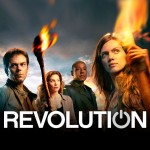As 21st century Westerners, we have come to take the power grid for granted. Streetlights make us feel safe at night and we cherish the warmth and brightness of our homes. We have also grown addicted to our gadgets and devices, feeling lost without our cellphones and “needing” the latest iPad or tablet computer. So what would happen if the power went out… permanently? This is the premise for J.J. Abrams latest TV show Revolution, currently airing on America’s NBC network. Revolution takes us back into the dark ages (pun intended): to villages based in agriculture and those in power collecting taxes in the form of crops. Major Chicago landmarks, such as Wrigley Field, are overgrown and abandoned and former streets are now home to weed grasses as far as the eye can see. And those devices that we have grown so heavily dependent on? Relics of the past.
Revolution follows a longstanding sci fi premise of a technologically advanced society going backwards. Initially set in present day, the pilot opens with main character Charlie’s father coming home to warn of the impending doom. Once the lights go out, Abrams flashes forward fifteen years to a now young adult Charlie and her teenage brother living in a small agricultural village and hunting with crossbows. When the militia (the modern version of the dark age knights) shows up looking for their father, the series’ main conflict begins. Apparently, Charlie’s father knows something about why the lights went out, and therefore has peaked the interest of Monroe, the general in power. Following a shootout which kills her father and the kidnapping of her brother by the militia, Charlie, her father’s mistress, and a village friend set out for Chicago in search of Charlie’s uncle Miles, who also finds himself on the militia’s radar for the same reason as his brother. Once found, the now orphaned Charlie tries to convince Miles to help her find and rescue her brother.
As a person who requires a viable story and well developed, three-dimensional characters in order to enjoy a movie or TV show, I must admit that I really enjoyed watching Revolution. The characters are not only well-written, but well cast. Tracy Spiridakos successfully portrays Charlie’s toughness, as well as her endearing vulnerability, and yes boys, she is hot to boot. Elizabeth Mitchell leaves nothing to want as Rachel, Charlie’s father’s mistress, effectively depicting strength and determination, as well as tension with Charlie, which one could cut with a crossbow, and Billy Burke is fantastic as the unpredictable, jaded Miles, trying to maintain a low profile in hiding from the militia. The one character I had a harder time believing was Graham Rogers as Charlie’s brother Danny. He seemed to be playing an idea of his character, rather than his character itself.
While Revolution does not disappoint in story, it also caters to those who prefer simple, good old-fashioned action. Danger abounds as Danny tries to escape from the clutches of the militia and the crew of three try to make it to Chicago, while at the same time eluding bandits and the militia (Bandits killed Charlie’s mom sometime in the fifteen years between the lights going out and the point at which the show is set). Charlie also states that her Uncle Miles is good at killing, setting up a scene towards the end of the pilot in which Miles takes on a dozen or so militia men and defeats them in a thrilling action sequence lasting several minutes.
All in all, Revolution has the potential to gain a wide, diverse audience base with something to offer to everyone. Definitely worth your forty-five minutes.
Revolution is still waiting for a pick up in the UK, but be sure to keep an eye on our UK air dates page for news of when it premieres.


